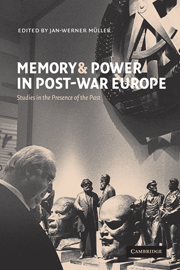Book contents
- Frontmatter
- Contents
- List of contributors
- Acknowledgements
- Introduction: the power of memory, the memory of power and the power over memory
- Part 1 Myth, memory and analogy in foreign policy
- 1 Memory of sovereignty and sovereignty over memory: Poland, Lithuania and Ukraine, 1939–1999
- 2 Myth, memory and policy in France since 1945
- 3 The power of memory and memories of power: the cultural parameters of German foreign policy-making since 1945
- 4 The past in the present: British imperial memories and the European question
- 5 Europe's post-Cold War remembrance of Russia: cui bono?
- 6 Memory, the media and NATO: information intervention in Bosnia-Hercegovina
- Part 2 Memory and power in domestic affairs
- Index
1 - Memory of sovereignty and sovereignty over memory: Poland, Lithuania and Ukraine, 1939–1999
Published online by Cambridge University Press: 22 September 2009
- Frontmatter
- Contents
- List of contributors
- Acknowledgements
- Introduction: the power of memory, the memory of power and the power over memory
- Part 1 Myth, memory and analogy in foreign policy
- 1 Memory of sovereignty and sovereignty over memory: Poland, Lithuania and Ukraine, 1939–1999
- 2 Myth, memory and policy in France since 1945
- 3 The power of memory and memories of power: the cultural parameters of German foreign policy-making since 1945
- 4 The past in the present: British imperial memories and the European question
- 5 Europe's post-Cold War remembrance of Russia: cui bono?
- 6 Memory, the media and NATO: information intervention in Bosnia-Hercegovina
- Part 2 Memory and power in domestic affairs
- Index
Summary
Revanchism, ethnic cleansing and war are all results of memory; peace in a part of the world where border changes, nationalist murder and bloody conflict are well remembered is at least as interesting. Since the end of the Second World War, Lithuanians have believed that Poland would seize Vilnius if given the chance, while Poles recall Ukrainians (after the Germans) as the greatest and most vicious wartime enemy. Since 1989 Poland and its eastern neighbours Lithuania and Ukraine have successfully negotiated issues of past conflict, in large part because of awareness of the problems memory must pose for statesmen. The question of the importance of national sovereignty to collective memory, and the possibility of gaining sovereignty over memory by way of national policy, involves four theoretical problems.
First, we must distinguish history from memory, while establishing the nature of their mutual independence. Neither can be studied apart from the other, and yet without separate conceptions the study of neither can proceed. Second, we must distinguish two types of collective memory. The first is the recollection of a large number of individuals of events in which they took part. This sort of collective memory we shall call ‘mass personal memory’. The second is the organisational principle that nationally conscious individuals use to organise the national history. This is ‘memoire’ rather than ‘souvenir’, a ‘frame’ (Yuen Foon Kong) rather than a picture. It allows us to place events in the national history, whether or not we took part in them.
- Type
- Chapter
- Information
- Memory and Power in Post-War EuropeStudies in the Presence of the Past, pp. 39 - 58Publisher: Cambridge University PressPrint publication year: 2002
- 20
- Cited by

